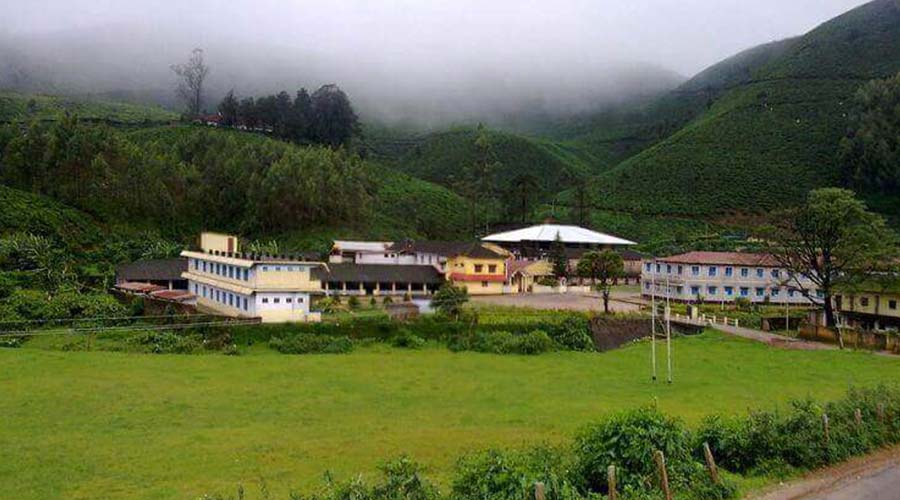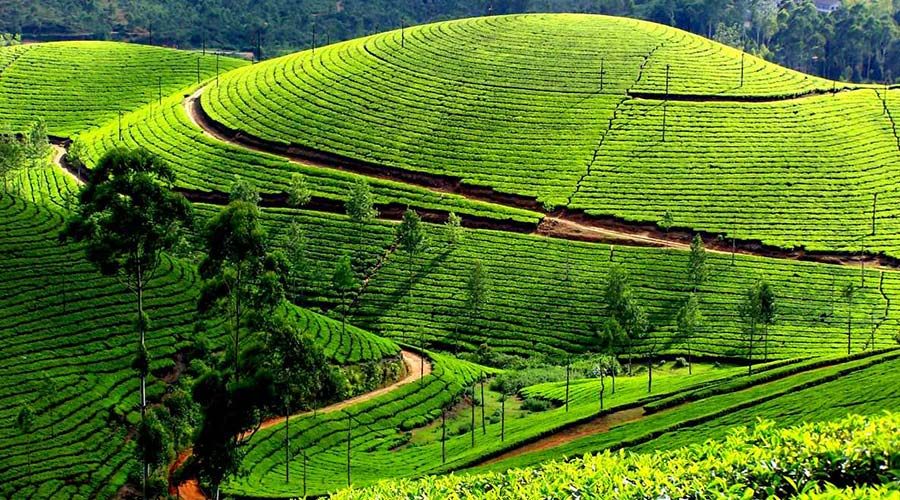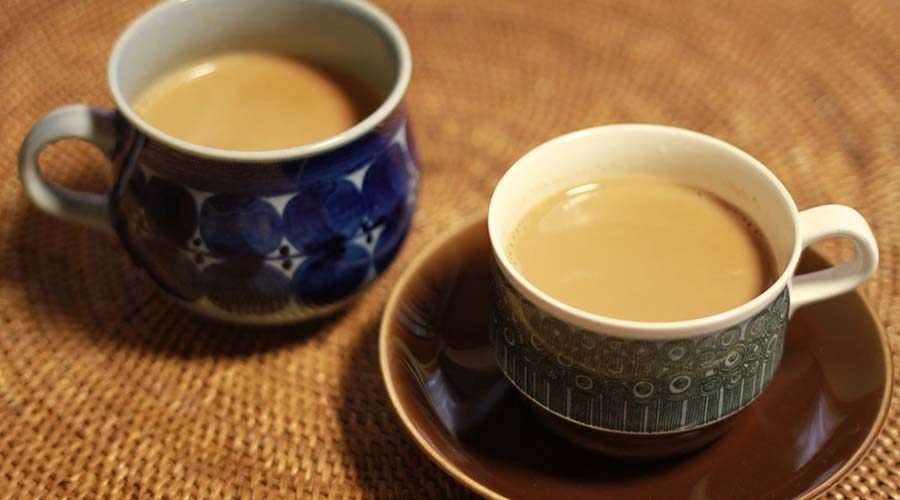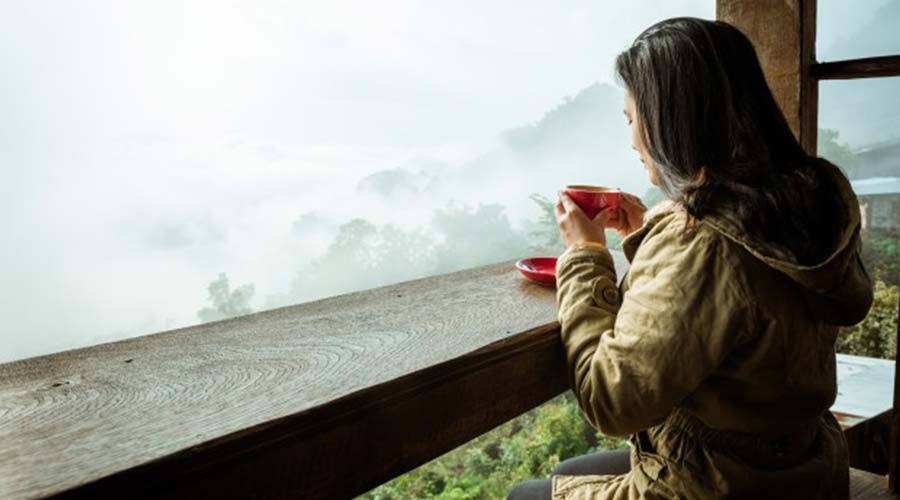Tea @ Munnar
Tea is an aromatic beverage commonly prepared by pouring hot or boiling water over cured leaves of the tea plant, Camellia sinensis.
Cultivation and harvesting
Tea plants are propagated from seed and cutting; it takes about 4 to 12 years for a tea plant to bear seed, and about three years before a new plant is ready for harvesting.
Tea plants require at least 127cm (50 inches) of rainfall a year and prefer acidic soils.
Many high-quality tea plants are cultivated at elevations of up to 1,500 m (4,900 ft) above sea level: at these heights, the plants grow more slowly and acquire a better flavor.
Only the top 1–2 inches of the mature plant are picked. These buds and leaves are called flushes. A plant will grow a new flush every seven to fifteen days during the growing season.


Content
Tea contains catechins, a type of antioxidant. In a freshly picked tea leaf, catechins can comprise up to 30% of the dry weight. Catechins are highest in concentration in white and green teas, while black tea has substantially fewer due to its oxidative preparation.
Tea also contains the amino acid L-theanine which modulates caffeine’s psychoactive effect and contributes to tea’s umami taste. Caffeine constitutes about 3% of tea’s dry weight, translating to between 30 mg and 90 mg per 8-oz (250-ml) cup depending on type, brand and brewing method.
Tea also contains small amounts of theobromine and theophylline, which are stimulants and xanthines similar to caffeine.
Health effects
Tea has been historically promoted for having a variety of positive health benefits.
Tea catechins have known anti-inflammatory and neuroprotective activities, help regulate food intake, and have an affinity for cannabinoid receptors, which may suppress pain and nausea, and provide calming effects.
Tea contains L-theanine, an amino acid whose consumption is strongly associated with a calm but alert and focused, relatively productive (alpha wave-dominant), mental state in humans. This mental state is also common to meditative practice.


Preparation
The traditional method of making or brewing a cup of tea is to place loose tea leaves, either directly or in a tea infuser, into a tea pot or teacup and pour freshly boiled water over the leaves.
Most green teas should be allowed to steep for about two or three minutes, although some types of tea require as much as ten minutes, and others as little as 30 seconds. The strength of the tea should be varied by changing the amount of tea leaves used, not by changing the steeping time.
In India, black tea is often boiled for fifteen minutes or longer as a strong brew is preferred for making Masala chai. When the tea has brewed long enough to suit the tastes of the drinker, it should be strained while serving.
Tea is sometimes taken with milk. The order of steps in preparing a cup of tea is a much-debated topic, and can vary widely between cultures or even individuals. Some say it is preferable to add the milk before the tea, as the high temperature of freshly brewed tea can denature the proteins found in fresh milk. Others insist it is better to add the milk after brewing the tea, as most teas need to be brewed as close to boiling as possible.
A 2007 study published in the European Heart Journal found certain beneficial effects of tea may be lost through the addition of milk.
Many flavorings are added to varieties of tea during processing. Among the best known is the spices in Indian masala chai, and Earl Grey tea, which contains oil of bergamot.

Munnar
The Kanan Devan Hills Plantations Company Private Limited (KDHP) succeeded Tata Tea Limited on 1st April 2005, when the latter exited most of its plantations in Munnar to focus on the growth of its branded tea business. With its 7 extensive estate gardens (Chundavurrai Estate, Guderale Estate, Gundumallay Estate, Letchmi estate, Madupatty Estate, Nullatanni estates and Nyamakad Tea Estate) covering approximately 24,000 hectares, the company is today the largest tea corporate in South India with an annual production of 21 million kg of tea.
White tea and Green tea is famous followed by organic orthodox and dust variety of these tea estates.
Harrisons Malayalam Limited tea was first planted in South India during the 1800’s. Harrisons Malayalam Limited, grows tea both in perhaps the highest elevation in the world as well as in low areas. As such, producer of a wide variety of teas. The company produces about equal quantities of CTC and Orthodox teas and can shift production from one to the other depending on market needs.
The company operates 10 tea estates with a planted area of about 6000 ha and 12 Tea factories. The grades produced are Whole leaf, Broken, Fannings and Dust. The company also produces a limited quantity of Organic Orthodox/CTC teas from its Touramulla estate.
Talayar Tea Estate comprising of 2460 acres of tea plantation is owned by Woodbriar group at Devikulam, Kerala under the name of Talayar estate. CTC tea of super dust variety is readily sold in the market from this estate.
Tea @ Kaivalyam
A visit to rolling tea gardens of Munnar is not complete without soul-filling sips of local estate teas. For our esteemed guests we are putting down a menu to be savored and leaving you salivating…wanting more after each sip.
White Tea (KDHP/ Harrison Malayalam) – Silver needles, the highest grade of white tea comprised of buds of specific tea clones. Plucked, steam and dried buds with least processing imbibes maximum anti-oxidant with minimum caffeine forms the best of healthy teas. A cuppa of white tea has delicate, light and slightly sweet flavor.
Green Tea (KDHP/ Harrison Malayalam) – Selectively hand plucked bud and top leaves steamed and dried. Each process brings out those classic green tea notes, which range from really vegetal and grassy, to buttery and nutty. A cup of tea provides fresh aroma with first sip like mouth awakening. The taste lingers on…slowly dissolving until the next sip.
Orange Pekoe (KDHP) – Highest grade of black tea with new flushes – leaf bud plucked with two youngest leaves. With rich fragrance, the liquor is thick with a lingering sweetness in the finish.
Flowery Orange Pekoe (Kollukumalai – Orthodox) – The new flushes hand plucked during the slow growth periods have golden tip and hence the grade ‘Flowery’. The background light bitterness characterized the orthodox nature. The higher elevation provides smooth texture and mellow effect in each sip.
Broken Pekoe (KDHP/ Talayar – CTC) – The second grade mostly granules designated as broken leaf produced by a modern, mechanical process that tears the leaf in order to induce oxidation. Light brew characterize with flavor is mostly preferred as black tea however strong brew can be used with milk.
Flowery Broken Orange Pekoe (Kollukumalai – Orthodox) – Courser and broken with some tips to provide a strong liquor which is refreshing blend of flavor and color. The background bitterness characterizes orthodox quality.
Broken Orange Pekoe Fannings (Talayar – CTC) – Broken leaf about the size of pin head still have a recognizable coarse texture. It is the third grade mostly used in tea bags. Fast infusion makes strong liquor good with milk.
Flowery Broken Orange Pekoe Fannings (Kollukumalai – Orthodox) – Strong and bitter along with smoothness characterizes the orthodox quality of higher elevation tea.
Dust (KDHP/ Talayar – CTC) – The last grade of black tea provides the strongest brew. Our usual Chai tea is prepared by dust tea power. It provides rich color, aroma and strong dose of caffeine.
Fresh Lemon Tea (Mint/ Ginger/ Honey) – Black tea infused with boiling water along with lemon and mint. Sweetened with honey, the taste is refreshing and soothing.
Special – Winter Frost Tea (Harrison Malayalam) – Specialty black tea prepared in semi-orthodox manner consists of handpicked leaves during winter times. It captures soothing aroma with mouth full effect.
Masala Tea (Ginger, Cardamom, Cinnamon, Pepper, Mix) – Spice tea combines black tea with fresh spices like ginger, cardamom, cinnamon, clove, pepper… it is warm and inviting fragrance, zesty flavor, and invigorating, aromatic finish.
Milk and sugar can be added for taste and suitability.
